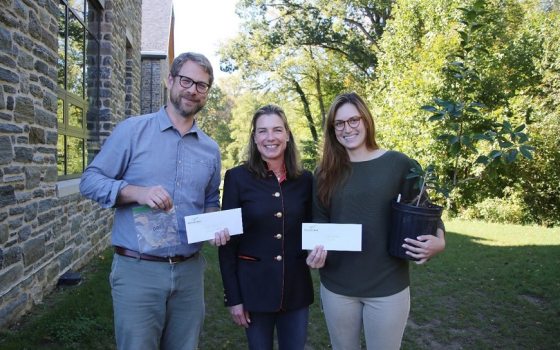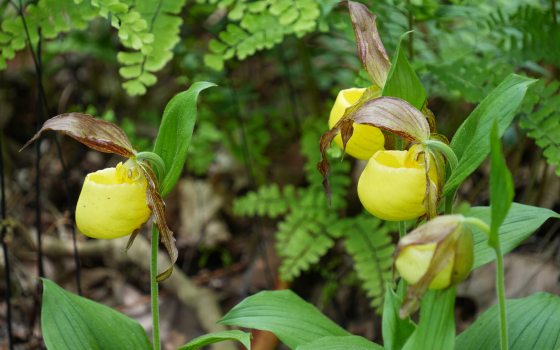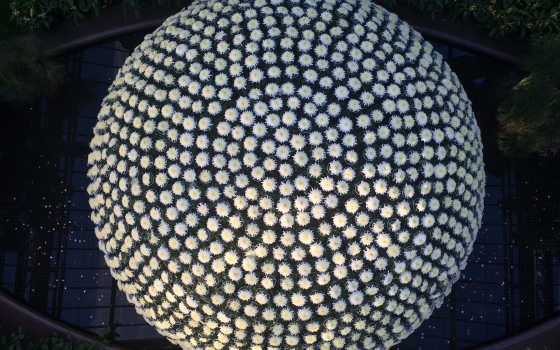Lady’s slippers (Cypripedium) are among the most charismatic, well-known, and beloved of all native orchids in Pennsylvania … and among the most threatened. Many local groups have been involved in conserving the pink lady’s slipper (Cypripedium acaule) found in the Wissahickon Valley Park, including The Morris Arboretum, Friends of the Wissahickon, The Wissahickon Garden Club, and Springside Chestnut Hill Academy in Philadelphia. As part of this common conservation goal, last fall I had the pleasure of assisting Springside Chestnut Hill Academy environmental science students in planting 15 of those pink lady’s slipper seedlings on the school grounds. It was an unforgettable experience, not only because this project may lead to findings that could inform future orchid restoration plantings at Longwood, throughout Pennsylvania, and beyond … but also one that we hope could help inspire a new generation of conservationists.
In an April 2020 blog post, we shared with you our latest efforts to restore the pink lady’s slipper found in the Wissahickon Valley Park, from hand-pollinating flowers in April 2019 to growing 78 resulting seedlings in our Research Nursery. The partnership between Longwood, the Wissahickon Garden Club, and Springside Chestnut Hill Academy started three years ago, prompted by the 2019 discovery of three flowering plants in the park— thought to have disappeared from the Wissahickon Valley—by local citizen scientists.
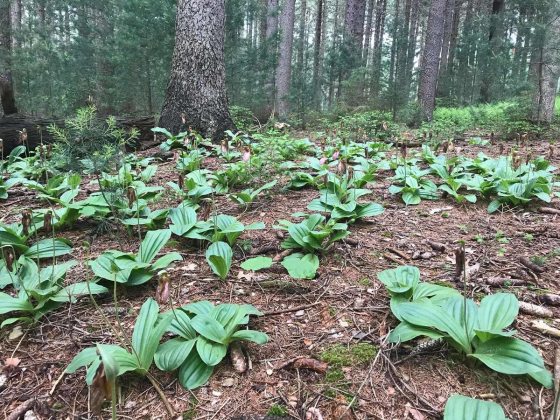
This discovery led to active interest in the orchid’s conservation and repopulation of the plant … as well as to my exceptionally valuable and fun day with the students. We began our day with a deep dive into the importance of the orchid species, the details of their endangerment in the Wissahickon Valley, and why they are being reintroduced locally. From the classroom, we ventured to a pre-selected location in the forest adjacent to the McCausland Lower School. We selected this location during prior visits to the school because of its occurrence of known associated species of pink lady’s slipper, such as chestnut oak (Quercus montana), mountain laurel (Kalmia latifolia), black birch (Betula lenta), as well as its favorable soil pH … all with the hope that this area would prove ideal for long- term growth of the orchid seedlings. Soil pH may be the most critical factor in cultivating pink lady’s slipper long-term, as this species is known to require a very low pH (>4) to thrive.
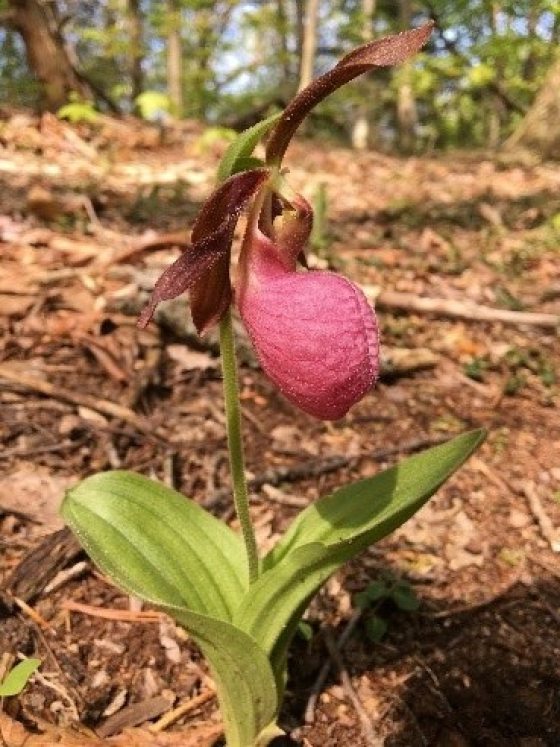
Along with the seedlings, the students also planted several mountain laurels. The official state flower of the Commonwealth of Pennsylvania, this species requires similar soil pH conditions to the pink lady’s slipper and may promote soil fungal (mycorrhizae) diversity, which in turn may help create a soil and climate microenvironment that stimulates the growth of the orchids. They are also among our most beautiful and recognized native plants and will lend interest to the planting site throughout the year.
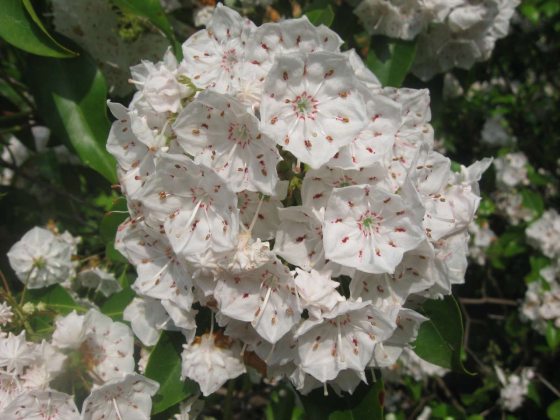
As part of their environmental science elective, participating students at the school will record data on the orchids’ survival and development and share their data with Longwood. Students will monitor the seedlings they planted using GPS coordinates and will track the date of first emergence; the number of shoots, leaves, flowers, and leaf area using imaging on a monthly basis; and the date the plant enters dormancy. Future plantings will help explore the question of what age and season is optimal to successfully reintroduce the pink lady’s slipper.

The seedlings planted by the students were grown on a special soil for one year of growth in controlled growth in greenhouse conditions at Longwood. Here at Longwood, we will continue to cultivate additional seedlings with the hope that additional seedlings can be added to the school restoration plot next year and beyond, This could provide important information about the best age at which to plant pink lady’s slipper seedlings for conservation efforts.
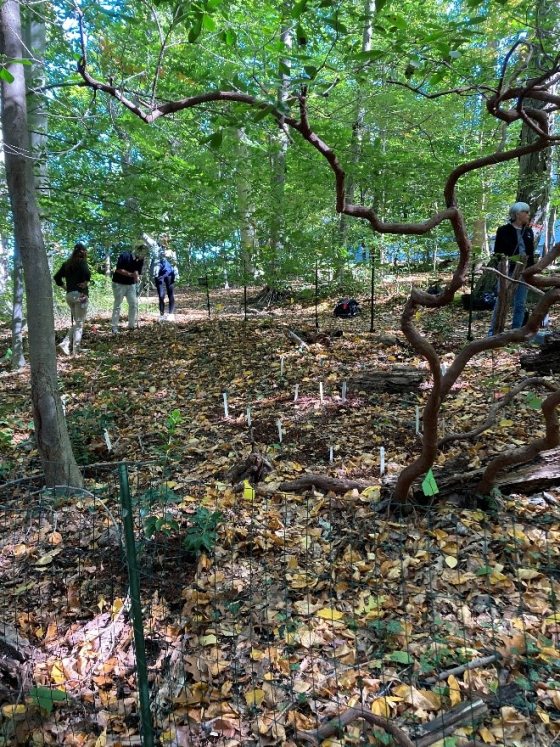
Speaking of age … it is the hope that, beyond helping conserve the pink lady’s slipper, this project at Springside Chestnut Hill Academy will help teach students of all ages the fundamentals of applied plant conservation and restoration, and ultimately inspire a new generation of conservationists. A retired professor that spent 40 years studying and observing pink lady’s slipper in Virginia wrote in one of his papers that these plants are “essentially immortal” and that generation times for other lady’s slipper orchids were estimated to be between 110 and 380 years! What this means, is that if that everything goes well with these initial plantings, students could be collecting data, making observations, or become inspired about orchid restoration and conservation for decades—or even centuries—to come.
Editor’s note: Learn more about our orchid conservation efforts when our new Orchid House opens on February 26 as our first realization of Longwood Reimagined: A New Garden Experience. See our amazing collection firsthand, learn more about the house’s careful restoration, and explore how we conserve rare and endangered orchids both here and abroad.
